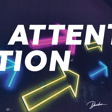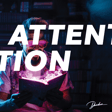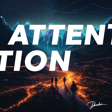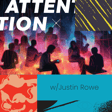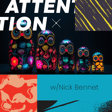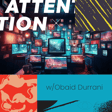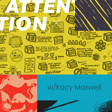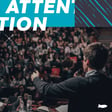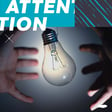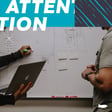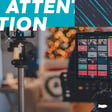Become a Creator today!Start creating today - Share your story with the world!
Start for free
00:00:00
00:00:01

Overcoming Perfection, Forgoing Polish, & Starting Your Content Journey w/Michael Hartmann
In this episode, Dan Sanchez talks to Michael Hartmann who is the Senior Director of Marketing Operations at Informa Markets.
We talked about the most common obstacles around building an audience:
- Overcoming perfectionism
- How he collects feedback
- The process for getting better
We talked about the most common obstacles around building an audience:
- Overcoming perfectionism
- How he collects feedback
- The process for getting better
Transcript
Introduction to The Attention Podcast
00:00:03
Speaker
Welcome back to The Attention Podcast, where you learn how to gain and retain the attention of your buyers to build an audience. I'm Dan Sanchez with Sweetfish, and today I interviewed Michael Hartman, who is the principal of Hartman Advisory Group, the senior director of marketing operations at Informa Markets, and the host of the Mo Pro's podcast.
How to Overcome Perfectionism and Start Building an Audience
00:00:23
Speaker
Today we talked about the most common obstacle around building an audience. And that's just not getting started due to perfectionism. So in this episode, we cover how to overcome perfectionism, how he collects feedback, and the process he uses for iterating and getting better. And be sure to stick around to the end where I cover my top takeaways and what I'm going to implement for the show.
00:00:52
Speaker
So Michael, in the pre-interview, when we were talking about audience growth, something that you said that jumped out to me was that people shouldn't worry about being polished. Why is that? It kind of comes down to, I think, one of the people who've worked with me over the years probably will recognize this. I always say that perfection gets in the way of progress. And I think there's a lot of people who feel like
00:01:15
Speaker
I need to have something perfect or polished, maybe the alternative word, right? But I think in your pursuit of getting something that's perfect or polished, you feel like, oh, we can't really put this out because we won't look good. I'm not saying don't put some care into what you're producing, whether it's written content, podcasts, videos, whatever.
Managing Stakeholder Inputs and Moving Fast with Content
00:01:38
Speaker
But at the same time, I truly believe that what is perfect or what is beautiful or what is well-written is a fairly personal kind of point of view, really. And so trying to solve for that, especially if you are like, I've been a big organization where you have so many stakeholders who all have different points of view. It's really hard.
00:02:01
Speaker
to get something out because you're going through all these different reviews. People feel like they need to have their input. And two things happened. I think they're both negative. One is it takes a long time to get it out, right? So you're slow to get... So if you really want to move fast, I think not focusing on being perfect is one thing that's important. The second is that
00:02:21
Speaker
When you get that many people involved, very often what happens is you get the least common denominator result and actually it becomes less good in an ironic way. That's not to say you don't want to seek input. I think it's when you get input and then you need to be comfortable with going to market with stuff that may not be completely polished.
00:02:42
Speaker
But we'll be, and I hate to say good enough, but good enough to start moving the needle. And I think then you can learn. I mean, that's the beauty of the current kind of world of marketing is that we get so much data that if we, I think we spend too much time upfront trying to get perfect and not enough time understanding
00:03:01
Speaker
Was that perfect piece of content? Did it perform the way we expected it to? I think the shift should be a little more towards understanding what worked, what didn't work, and then feeding that back into the next time.
Learning from Content Data and Favoring Quantity
00:03:15
Speaker
Absolutely. So on this quantity versus quality debate, the feeling you're going to push a little bit more into the quantity, and it kind of makes sense. And this is kind of like if there was ever a team between the two, of course, it's both, right? But if there was ever a team, I'd probably find it more on quantity side.
00:03:30
Speaker
just because if I can take more swings and take a lot more misses, after a while, after hundreds of swings, I'm probably going to have way more hits than the person who only took one swing a day, if I'm taking hundreds of swings a day. I'm having more misses, but I'm also probably going to get better faster, right? Especially people who grew up in a digital age for photography, just as an example, right? I didn't. I'm older. I grew up where you had to have film, and film was expensive, and processing the film was expensive.
00:03:58
Speaker
And what I've learned is the big difference between the casual photographer, home photographer, and the professional back in those days, professional photographers didn't necessarily always take better photographs, but they took more, right? So they had more opportunities to get good photographs than we did
00:04:15
Speaker
Yeah, there's also equipment and everything else, but at the end of the day, it was the volume of stuff that they did that produced the best things. And then over time, they learned how to get better at framing and everything else, which I think that's the point. It's a good analogy for what I just described. I'd like your analogy to get more swings and more opportunities.
00:04:39
Speaker
I do want to clarify, I don't know that it means just sheer volume is not to me the right answer either, but I do think being able to move quickly and learn quickly and then adjust.
Collecting and Acting on Feedback
00:04:52
Speaker
To me, that's the real game changer of not focusing on being perfect or polished.
00:05:00
Speaker
Yeah make sense i mean even with this podcast i release the first ten episodes and i edited myself the next ones are gonna be professionally edited. And i'm changing the format so it's kinda like you just have to start making changes most people who do quantity and the reason why people don't like them is cuz they just keep doing the same thing.
00:05:19
Speaker
and it's never getting better, right? Absolutely. I wonder, even in the beginning, when you're just getting started, how do you know it's good enough? Because I'm sure we've seen some content out there. It's kind of like, did you even read what you wrote? It doesn't even make sense, right? Sure. How do you coach your team members on getting started? And do you think they even still today default too close to being perfect or they go too fast sometimes?
00:05:44
Speaker
Yeah, and I think this goes beyond content. And my world is a little less focused on content production in my day job. Podcast is a different thing, but day job is more marketing operations. And yeah, there's a lot of reporting or analysis and things like that. And it's really easy to get caught up in doing too much analysis almost, right? So you're doing so much analysis, you're not actually getting insights.
00:06:09
Speaker
And i think so the same thing happened so my my point is. First off you can't know everything about how that is gonna work right so do good work right get it to a point where you are comfortable putting it out in the world and then see what the reaction is.
00:06:28
Speaker
And this is the hard part, is being willing to take that feedback and the input, whether that's from colleagues, friends, family, and in a podcast case, listeners. We've done this actually, we've been very focused on OpsCast, the podcast I'm co-host of, that we are always seeking input. And I wanted to be creative and try some things. So our audience is very much focused on
00:06:54
Speaker
option tech we had a guest on one time who did who's who has a podcast herself that focuses on audio branding. Which I thought our audience being curious would be very interested and I thought she was interesting it was very it was I think they found it interesting but this one for example that's one podcast where I got feedback that was not wouldn't even say was negative was like hey that was interesting but.
00:07:18
Speaker
Can you focus on these? That's not really something I think will be something our audience will care about. Your audience will care about as much. So there was a good lesson to be open to that feedback. And so we learned and we pivoted. This goes way back, for me personally, this goes back to when I first moved from IT management consulting into marketing.
00:07:39
Speaker
When I was at Texas Instruments, one of the first couple of weeks I was there, we actually did a customer panel. I can never remember if it's one-way glass or two-way glass, the mirror. We were behind that and they couldn't see us. I remember literally standing up,
00:07:56
Speaker
shaking my fist going, what are these customers saying? What are they talking about that makes no sense? In that moment, it really hit me like, oh my God, we'd really have to listen to their feedback. What I learned in that moment was really important not only for customers, but also internally. Again, being in charge of web content at the time for a specific part of the business, there was no shortage of people giving us feedback about what we should do, shouldn't do, what was working, not working.
00:08:25
Speaker
you know, a data point of one. So I used to get defensive when people would come to me with that feedback and it was really sort of a natural reaction. But what I've learned to take from that was they're not really criticizing me. They're sharing their opinion, their input, and they want us to know. So one of the things I've always told my teams since then is go seek that
Using Feedback to Iterate and Improve
00:08:48
Speaker
feedback. Don't tell people not to. I always tell people, give me that feedback, bring it on. Doesn't mean I'm going to act on it.
00:08:55
Speaker
But if I was to stop that flow of input, what I know is I would be missing, well, there's one person who has that opinion, here's a second person, a third person, and I start to see these patterns of feedback. And that's what I really wanted. And so that was a key part for me of sort of my personal growth and how I try to track my team. Just don't take this stuff personally, right? Don't allow people, like personal attacks, that's not okay. But feedback like that,
00:09:23
Speaker
Let it come through and I especially as much as I think most marketers might not like to hear this like I especially liked hearing it from salespeople or customers to support because they're the ones interacting with customers all the time. So I usually actually pay more attention to that than I do say to other marketers. Sorry marketers, but that's I think.
00:09:43
Speaker
If you really want to be customer serving or customer facing or doing what's right for the customer from a messaging standpoint, then you need to listen to the people who are talking to them all the time. What were some of the steps you were taking to elicit feedback?
00:09:59
Speaker
Yeah, so one is just asking, so for an example, our podcast, we always end our podcast thanking our listeners, but also asking for feedback. And then when people do give the feedback, thank them. People want to be heard, they want to be appreciated. And then when I was doing website content, there would be opportunities for us to present data,
00:10:25
Speaker
Here's how the website's working, not working. Here are suggestions. I was always building in time though for them to provide feedback. And that just opened up the door for them to do that on a regular basis without being prompted at that point. So somebody's on the fence for getting started now and is worried about perfection. In our pre-interview, you talked about the importance of iterating. What kind of iterations are you currently making with your content?
00:10:51
Speaker
Well, I think I may take this in a little bit different direction. I'll use the podcast as an example of one way. I think this is iterating. I gave the example of the audio branding person, which wasn't really necessarily on point for our audience. But it was an iteration of trying something, sort of expanding the topic a bit to see how it worked, and then listening and learning from it.
00:11:13
Speaker
We also are continuing to, like we'll do, we're sort of playing with different things. So right now we're doing a series of interviews with different people just to hear their career journey. That wasn't something that necessarily was planned, but we had an opportunity to do one or two and people raised their hand and now we've had six or seven people involved in sharing their stories. And what's great as the person being involved in that is I'm seeing these different themes come through that are consistent across all of them.
00:11:38
Speaker
But it wasn't necessarily something planned. We didn't really go out to do that initially. But when it started, it just seemed to work well and it connected with our audience. But we're always, we want to kind of cover, we're covering different kinds of topics. And that's one of the things we're doing. I'm trying not to be, I'm actually a little bit, not concerned, but I feel like I don't want to let that
00:12:01
Speaker
kind of thread dominate too much longer because we need to get back to some other topics that our audience cares about. And I think that's one of the challenges, like how do we iterate, learn, but how do we also know when it's time to move on to something else? That's a big challenge. I mentioned reporting and analytics. This is a great example of where iteration comes into play, for marketers in particular.
00:12:24
Speaker
There's so much data out there. And I have not met a marketing leader who doesn't want, at least lately, who doesn't want to be data driven. And the challenge is figuring out what is the right set of data? What are the right set of reports? Do we do a dashboard? Do we not do a dashboard? How frequently do them? All those things are big questions. And again, it's kind of going back to this pursuit of perfection or polish. I think there's a real trap there where you can say like, we can't publish a dashboard until we have all, like we know exactly what everybody wants.
00:12:54
Speaker
The reality is you'll never get there. If you don't start with something, you need something to get the conversation going, to get this process started. In data and reporting, in particular, what I found is you put out one report and that either begs a question like, what's the spike here? What is that from? You have to go digging deeper. Or it goes, oh, I asked you for that, but what I really want is this additional piece.
00:13:22
Speaker
If you're doing it right, I think that there's a constant iteration until you get, there's probably some steady state, but that's an effort thing. Those are both examples of how iterating. Whether that's content, whether that's reporting, whether it's how you're implementing a strategy over time, I think iterating is a great way to approach it.
00:13:45
Speaker
to think, OK, I know the analogy I like to use for some of this stuff is sailing, even though I'm not a sailor. I know that typically you're going to go, I'm here at this point on this body water. I need to get over this other place. And really all I know for sure are the conditions where I'm at.
00:14:02
Speaker
So i make progress towards that end goal but it's not probably gonna be a straight line and be comfortable with that but that doesn't mean i don't want to start so i'm gonna start i'm gonna make a make progress toward their i'm a learn i'm gonna stand what's different and i'm gonna move move forward so i think if you think about it is all ties together iterating and not focusing on perfection kind of go hand in hand.
Experimenting and Learning from Failures
00:14:24
Speaker
It reminds me of what Jim Collins talks a lot about with cannonballs and bullets. You know what works, so you aim your effort at that. But at the same time, you should always be shooting out little bullets to test things. And maybe 80% of your work as a creator is the stuff that you know your audience likes, because you've already done enough to know that those are the topics that resonate, that hit, the things they want to know about.
00:14:50
Speaker
But at the same time, you still have to be taking small iterations and then get the feedback, right? You use something experimental. You edit in a different way. You talk about a different topic, right? Maybe you bring on a different kind of guest than you normally have. You can get feedback to see if that was one that missed or hit. Most of them will miss, but it was only one off, right? Then you can, if it hit, then you're like, well, I might do it again, right? I notice creators do this all the time, especially, it's most noticeable across the ones that are like,
00:15:18
Speaker
I think YouTubers, because you can go and scan their whole catalog really quickly and look at the thumbnails. You go to somebody like Dude Perfect, and they've done a number of episodes. And it's kind of like the same things over and over again. Like the ping pong ball into a cup that's bounced off 50 things, right? Or the boomerang. They've done a lot of different things and they kind of know what works for them. And then every once in a while, they take a creative step and do something totally different. And sometimes you can tell that it was a flop and they never did that again, right?
00:15:47
Speaker
I almost find that it goes like that for all things, whether it's podcast or social. It's finding your main lane and then always trying to evolve it by finding the next style or way to do it or topic.
00:16:07
Speaker
Yeah, I don't even remember. A lot of his books blend together. Interesting. One of my favorite quotes is from Teddy Roosevelt. I don't know exactly if you've seen a couple of variations of this, but it's essentially like the Man in the Arena. If you go look at Man in the Arena, Teddy Roosevelt, you'll find the quote.
00:16:29
Speaker
Basically, it's not the person who sat on the sidelines who really gets the glory. It's the one who got into the arena and got dirty and learned. Whether they won or lost, at least they knew where they stood.
00:16:44
Speaker
And that really has resonated with me. I want to try stuff. And if that means trying and failing, what would people say? Trying and learning, right? Either win or you learn. I think that mentality is something that could apply in just about any discipline, but especially in this world of marketing and revenue. What are some of the iterations you've taken with your podcast so far? What are some of the upgrades you've added after getting that feedback?
00:17:10
Speaker
So the first thing was, we really had no idea what we were doing, getting into it. And I think we initially thought, well, we actually started out as a live, almost like internet-based radio show on a different platform. And it was really interesting because we were brand new, so we had basically no audience at that time.
00:17:33
Speaker
We hand-filled people because it was tied to a community and people would come on and they would chat with us through the online chat. We had the option of bringing people on if they wanted to. Nobody ever raised their hand for that. But that was interesting. That platform ended up deciding to change strategically to focus on shorter content, and ours were clearly going to be outside of that realm. We quickly had to figure out other options.
00:17:58
Speaker
But I think we really liked that sort of raw feel of the live. So if you listen to our podcast, we really do not do any editing outside of like really stuff that's going to make it really hard for somebody to read or listen. So for example, if we end up with an echo or something like that. But otherwise, we've literally had somebody on who had a fire alarm go off in his apartment building, dogs barking, things like that, kids walking through the room.
00:18:26
Speaker
And so that really, I think, informed our overall, we want this to continue to feel like it was that kind of conversational thing. So that was a very important piece of it. So that kind of underlines everything. But from there, I think we started out focusing on very technical things, which are a quarter of what our audience does. So over time, what we knew was we needed to expand our audience. And so we started talking to more general marketing people.
00:18:54
Speaker
And if we would kind of alternate, we would hit, I don't know that it was, again, it wasn't necessarily totally intentional, but we sort of almost rotated core topics for a while. And then every once in a while, something would come up, whether it was through seeing LinkedIn conversations that were going on on this topic, we might ask somebody to join us to talk about that and really dig into it. You know, the idea of having people come on and tell their story. You know, we have co-hosts on ours and
Balancing Technical Content with Engaging Conversations
00:19:22
Speaker
Our very first episode was just the three of us, and then we usually have a guest room or a few guests, but we realized that we also wanted to continue to have some with just the three of us. We did a thing where we started doing ops cast at night, where we might have a cocktail or something in our hands.
00:19:41
Speaker
So we're just trying to do different things to keep it interesting. I think it would have been really easy to continue to go down on just doing the tech things and just doing the things that were really core day-to-day things that people did. But I really believe that what we need is we need to help this audience, our particular audience. Part of what we're trying to do is help them
00:20:02
Speaker
really be to learn on how they can make their career grow. And so we've talked to people who are in leadership roles, we've talked about people about career paths, we've talked about different things. And we did something once where just two of us got on and we just had one of these after dark conversations that we talked about. We were both getting frustrated with getting cold LinkedIn requests from salespeople. And so we sort of bashed salespeople actually in this episode.
00:20:30
Speaker
But at the end, we actually, again, we were just like, hey, if you're a salesperson and you want to give your side of this, let us know. And we actually had another episode where we had a couple of salespeople and I give their side of it. And I actually think it was beneficial for all sides to hear what they're thinking because this stuff happens when you're actually in a sales cycle, whether they're the buyer or the seller.
00:20:55
Speaker
I think most people are trying to do the right thing, but there's this awkward connection and this is just an open conversation about what they're doing and why they're doing it. We were reacting to it. I think those are the things we want to do is continue to look for, almost be opportunistic for like, oh, this is a topic that seems like it's resonating with our audience, but there doesn't seem to be a lot of clarity about how to even think about the problem.
00:21:21
Speaker
I think that's one of the things we're just trying to be open to that idea and looking like people are raising their hands saying they want to talk about stuff. I think that's really what we're trying to do is just continue to keep... We want the underlying feel and just the way the podcast comes across to be authentic and conversational.
Wrap-up and Overcoming Perfectionism Through Iteration
00:21:45
Speaker
and kind of deep, right? In terms of like we want to be ours are typically 40 to 45 minutes, sometimes longer. And that's because we go, I think fairly deep and very often though, even with that, we end up at the end, we're like, well, we really could have gone, you know, Joe Rogan style and gone another two hours.
00:22:02
Speaker
Absolutely. And there's a place for that on some kinds of podcasts where you go really long. And I think the reason why he does it is because it's all about the clips, right? He goes really long dives and it affords you to go into topics that nobody else can afford to go into because he takes the time to do it. And then you can get the little clips that nobody else can get because you were able to go five questions deep instead of just one or two. But at the same time, there's a reason why most people don't have three hour long podcasts.
00:22:30
Speaker
because it's hard to sustain attention for that long, right? So the short ones work. It has to be your only thing, I think. Yeah, absolutely. So, Michael, this has been a fascinating conversation about getting started, getting feedback, and then iterating based on that feedback. Thank you so much for joining me on the Attention podcast and sharing that with the audience. Where can people learn more about you, your podcast, and your company?
00:22:53
Speaker
Sure. Well, first off, thanks for having me, Dana. It's been a fun conversation for me, too. So if you're interested in connecting with me, I'm on LinkedIn. It's Michael Hartman with two Ns. And it should be easy to find. If you're interested in our podcast, it's called OpsCast. It's available in all the different players out there that you might use. And if you want to find out more about the community that it's related to for marketing ops, it's themopros.com. Those are probably the best places to connect with us.
00:23:21
Speaker
Fantastic. Again, thanks for joining me on the show. All my pleasure. Thanks, Dan.
00:23:28
Speaker
So after walking away with this interview from Michael Hartman, there's things that are kind of rolling around my brain and there's lots of takeaways, but here are the few things that stood out to me. Because honestly, I find that I hear things over and over again, but it takes a long time for them to actually happen. You ever find that happens to you? You hear a thing or you see a thing, you might see it on LinkedIn. You're like, oh, I know that. Oh, I know that. And you see it again. You're like, oh, that's old news. But how well do you actually do it?
00:23:57
Speaker
It's something we need to ask of ourselves and it's something I'm asking myself right now. There was a lot of things that we covered that seem like things that have been said before, things that I've heard on LinkedIn, even things that I've wrestled with. But after talking to Michael about it, it feels like I have a fresh perspective on it. And that's overcoming perfectionism, which is really at the heart of it, just insecurity.
00:24:22
Speaker
make that up i heard it from gary vanderchuk at one point where it's like perfectionism is really just a cover for insecurity i think he's right. And the best way to overcome it as a result of me kind of like talking this through with michael is really just getting. Started getting feedback and then iterating based on that feedback.
00:24:44
Speaker
Right. And we need to start all the time. It's not like a get start once and then get some feedback and iterate. No, it's you have to push yourself out there every day. Or at least if you want to grow an audience, I found that that's kind of the frequency. It leads to be something you're focused on every day. Does that mean you have to post something really big every day? No.
00:25:03
Speaker
Probably should be posting something somewhere but if you follow my two channel rule should probably at least be posting that short form content every single day at least five days a week here and be to be right but probably seven. You should be working on that if audience growth is a serious goal you have.
00:25:22
Speaker
than just getting started on creating the content so that you can get the feedback and then iterate. If you're going to win, it takes a lot of it. It's not just a once a week thing. It has to be a daily thing, a daily rhythm. That's why the best players, that's why the people who actually grow are the ones who are getting in the most reps.
00:25:40
Speaker
It's a volume play in your practice, but you have to be practicing enough to get to perfect. Actually, I don't even believe in perfect. I'm a big fan of the quote from Toyota, right? Always better. Never best. I think that's a good way to kind of frame up my thoughts of this episode and what you can do about it in order to embrace that always better, never best mindset. Get started. Get feedback.
00:26:08
Speaker
iterate based on that feedback. Repeat over and over every day, maybe multiple times a day. That's the process. That's the like behind the scenes grind and work of building an audience is going through that motion over and over and over again. So hopefully this interview has been helpful to you. I know it's really got me thinking and pushing into what's next for the show.


